
Ali S. Khan, M.D., is the Richard Holland Presidential Chair and Dean of the College of Public Health at the University of Nebraska Medical Center. He is a former Assistant Surgeon General with the US Public Health Service. His career has focused on health security, global health, climate change, and emerging infections. He completed a 23-year career as a senior director at the Centers for Disease Control and Prevention, where he led and responded to numerous high profile domestic and international public health responses. Dr. Khan was one of the main architects of CDC’s national health security program. He currently serves on the executive committee for WHO’s Global Alert and Outbreak Response Network. He is the author of The Next Pandemic: On the Front Lines Against Humankind’s Gravest Dangers. Dr. Khan has previously served on several NASEM committees, including the Committee on Best Practices in Assessing Morbidity and Mortality Following Large-Scale Disasters. He received his M.D. from Downstate Medical University, completed a med-peds residency at the University of Michigan, followed by his M.P.H. from Emory University and M.B.A. from University of Nebraska-Omaha.
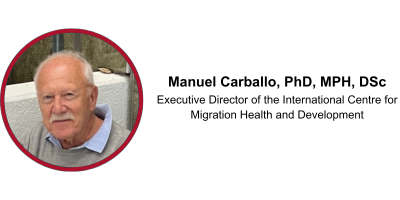
Dr. Manuel Carballo is an epidemiologist specialised in migration and migrant health. He is Executive Director of the International Centre for Migration Health and Development in Geneva. Prior to joining ICMHD, he held a number of senior scientist positions at WHO, and worked in a number of countries. He was the WHO Scientific Coordinator of the first International Study on Breastfeeding and Child and Maternal Health, and developed the International Code of Marketing of Breastmilk Substitutes. In 1986 he was one of the three-person team asked to develop the WHO Global Program on AIDS (GPA) where he remained until 1992 as Chief of Behavioural Research. In 1993 he went to Sarajevo as Public Health Adviser during the war until 1995. Since joining ICMHD he has coordinated major studies on the impact of migration on the epidemiology of viral hepatitis, migration and diabetes, impact of war on maternal and child health, access to healthcare and social integration of migrants, and psychosocial health of displaced populations. He has led UN health assessments in Afghanistan, Iraq, Iran, and the oPt. He was a UN lead on setting up camps in Albania and Macedonia for Kosovar refugees, and has been a technical adviser to the ECDC, the Council of Europe, WHO/EURO, WHO/HQ/, WHO/SEARO and UNAIDS on migration and health issues.
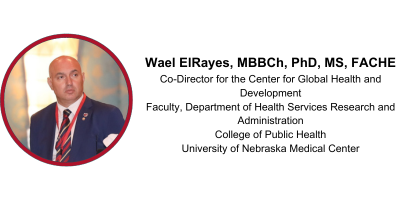
Dr. Wael ElRayes is a health professional with over 25 years of experience in clinical practice, health systems administration, healthcare project management, and international collaboration. He currently holds the position of Co-Director of the Center for Global Health and Development (CGHAD) and serves as a faculty member in the Department of Health Services Research and Administration at the College of Public Health, University of Nebraska Medical Center (UNMC), USA. Dr. ElRayes' work portfolio includes populations affected by conflict and humanitarian crises, focusing on the Rohingya refugees in Bangladesh and the Yazidis in Iraq/KRG.
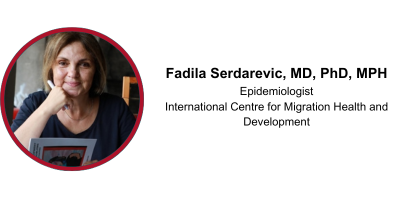
Fadila Serdarevic is a medical epidemiologist who was trained in Bosnia Herzegovina, the Netherlands and USA, including the US CDC, and has extensive experience in the investigation of disease outbreaks, including H1N1 and COVID-19, and the interaction between selected infectious diseases and early child neurodevelopment. She was a technical adviser to the development of surveillance systems and outbreak investigations in Chicago (USA) and Sarajevo (Bosnia and Herzegovina), where she has also helped the Bosnian Academy of Sciences and Art to develop its national Epidemic Location Intelligence System. She currently holds a joint appointment with Erasmus MC and the Sarajevo School of Science and Technology (SSST), where she has developed and managed academic courses for doctoral students in epidemiology and biostatistics. Her research interests are in infectious diseases and the neurodevelopmental epidemiology of pediatric infections, including SARS-CoV-2, and implications for related inflammations, and neuromotor outcomes, particularly motor complexity. Her previous research on minor motor abnormalities in infancy as predictors of autism has been an important contribution to early diagnosis of autism. Together with the Harvard T.H. Chan School of Public Health she was researching epigenetic markers of fine neuromotor development and with the ICMHD how migration and ethnic minority status can influence the risk of childhood infections and autistic and other psychiatric symptoms.
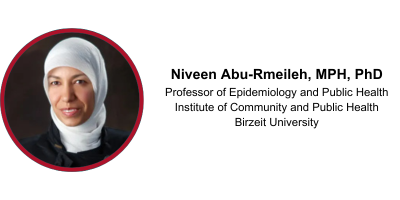
Dr. Abu-Rmeileh has strong experience in teaching and research, and she is well-versed in a variety of epidemiology and public health fields. Her teaching portfolio includes quantitative research methodologies, health statistics, and population studies, demonstrating her commitment to training the next generation of researchers. With a robust background in teaching and research, Dr. Abu-Rmeileh has cultivated a deep understanding of various disciplines within epidemiology and public health. Her teaching portfolio encompasses quantitative research methods, health statistics, and population studies, reflecting her commitment to fostering the next generation of researchers. Throughout her distinguished career, Dr. Abu-Rmeileh has led various national, regional, and worldwide research programs. Her research interests are broad, encompassing Noncommunicable Diseases (particularly diabetes, cancer, and tobacco smoking), Reproductive Health, and Health Information Systems. Notably, she is actively working to establish a reproductive health research team, with a focus on implementation research and systematic review methodologies. Dr. Abu-Rmeileh's achievements go beyond academics. She is a member of the Eastern Mediterranean Advisory Committee for Health Research (EM-ACHR) and the WHO-Eastern Mediterranean Research Ethics Review Committee. In addition, she is slated to become president-elect of the Global Implementation Society.
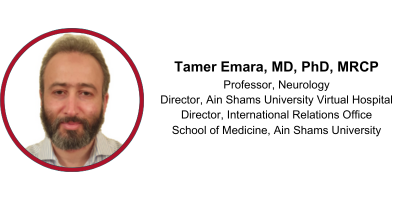
Dr. Emara's main academic interests are using technology to develop/improve healthcare services in the global south and promote research, development, innovation, and capacity building in digital health and cross-border healthcare. In Neurology, his main interests are neurorehabilitation, noninvasive neuromodulation, headache and dementia care.
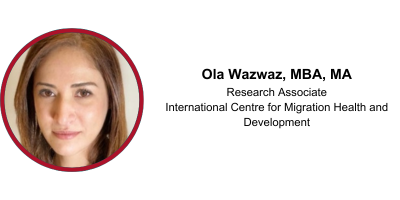
Ola Wazwaz is a Research Associate at the International Center for Migration, Health, and Development (ICMHD) in Switzerland, where her research addresses international relations, governance, women's health, social determinants of health, and health equity. Before joining ICMHD, she worked for the World Health Organization (WHO) HQ, where her work focused on maternal, newborn, and child health. Ola began her career in Palestine, where she worked with non-governmental organizations dedicated to sexual reproductive health and rights, and health and rights of people with disabilities.
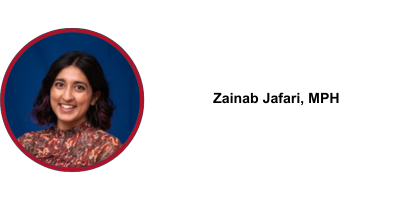
Zainab Jafari (she/her) is a recent graduate from Columbia University with master’s in public health and social work. She currently works at a NYC-based gender justice organization, Sakhi for South Asian Survivors providing clinical and programmatic services to 6-24 year old survivors of violence. Zainab specializes in working with immigrants, refugees, women, and youth on anti-violence and mental health, particularly in conflict and humanitarian settings. Prior to her graduate program, Zainab worked as a fellow at the Centers for Disease Control and Prevention in Atlanta, GA. At the CDC, Zainab worked on international cross-border health and disease surveillance, wrote and managed domestic grants supporting communities combating the opioid epidemic, and was deployed to the COVID-19 emergency response in the early months of the pandemic. Zainab’s practice integrates individual, community, policy, and global systems work to further public health and social work goals.

Alexandra Todd, MPH, holds the position of Public Health Associate at the University of Nebraska - Medical Center, where she specializes in Administration and Policy. Within the Dean's Office at the College of Public Health, her responsibilities encompass a diverse array of projects. These include but are not limited to the facilitation of speeches and presentations, the development of interactive online disease modules, engagement in research endeavors, and the orchestration of large-scale scientific publications.

